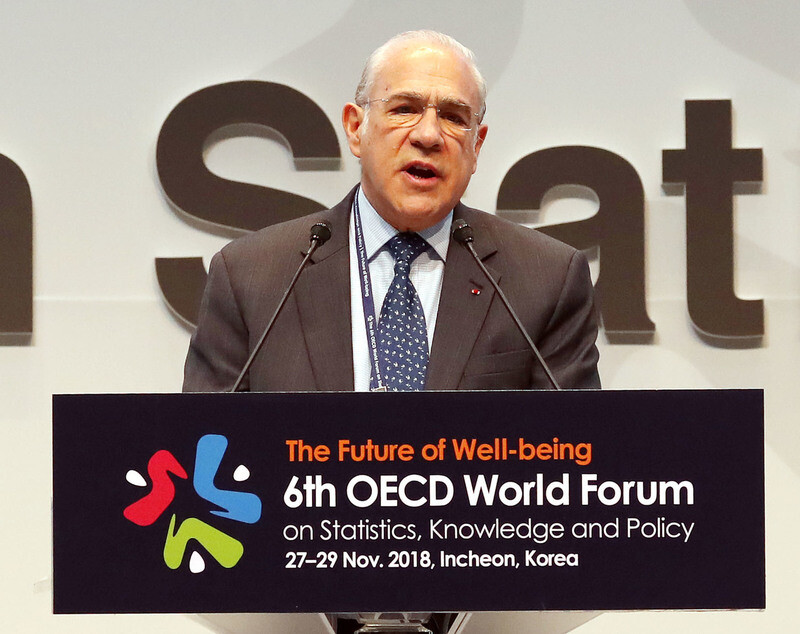hankyoreh
Links to other country sites 다른 나라 사이트 링크
OECD expresses support for Moon admin.’s policies for “inclusive growth”

“The Moon Jae-in administration’s vision of an inclusive state strongly accords with the inclusive policies pursued by the OECD.”
OECD Secretary-General Angel Gurria voiced this message in a keynote speech at the 6th OECD World Forum on Nov. 27, stressing that the goal of the organization is “to present policies that do not leave a single person excluded.”
Indeed, the OECD and the Korea Development Institute (KDI) plan to begin work next year on researching examples of “inclusive growth.” In a meeting with Deputy Prime Minister and Minister of Strategy and Finance Kim Dong-yeon after his speech, Gurria announced plans to “cooperate to ensure a successful study.”
In a press conference the same day, OECD Director of Statistics Martine Durand said the organization “supports the South Korean government’s efforts to achieve work-life balance through reduced working hours and other measures.” Durand described South Korea as being “one of the lowest-ranking countries in terms of subjective well-being,” citing the long working hours, low rate of economic participation by women, and competitive focus in education.
Results for the OECD’s Better Life Index (BLI) last year showed South Korea ranking 29th out of 38 countries examined, with South Koreans rated as having low levels of life satisfaction, a strong sense of professional pressure, and a very low sense of social bonds (community).
Explaining her reasons for supporting South Korea’s 52-hour workweek ceiling, Durand said, “With fathers [in South Korea] working long hours, mothers feel lonely at home, and with children sent to public and cram schools, families spend little time together.”
Professor of Economics at Columbia University Joseph Stiglitz also expressed a favorable view.
“Although it isn’t as serious as in the US, South Korea has problems with inequality,” he said.
“While the US government is pushing policies that exacerbate inequality, the South Korean government is showing a strong commitment to reducing inequality,“ he noted.
By Jeong Eun-ju, staff reporter
Please direct comments or questions to [english@hani.co.kr]

Editorial・opinion
![[Column] Has Korea, too, crossed the Rubicon on China? [Column] Has Korea, too, crossed the Rubicon on China?](https://flexible.img.hani.co.kr/flexible/normal/500/300/imgdb/original/2024/0419/9317135153409185.jpg) [Column] Has Korea, too, crossed the Rubicon on China?
[Column] Has Korea, too, crossed the Rubicon on China?![[Correspondent’s column] In Japan’s alliance with US, echoes of its past alliances with UK [Correspondent’s column] In Japan’s alliance with US, echoes of its past alliances with UK](https://flexible.img.hani.co.kr/flexible/normal/500/300/imgdb/original/2024/0419/2317135166563519.jpg) [Correspondent’s column] In Japan’s alliance with US, echoes of its past alliances with UK
[Correspondent’s column] In Japan’s alliance with US, echoes of its past alliances with UK- [Editorial] Does Yoon think the Korean public is wrong?
- [Editorial] As it bolsters its alliance with US, Japan must be accountable for past
- [Guest essay] Amending the Constitution is Yoon’s key to leaving office in public’s good graces
- [Editorial] 10 years on, lessons of Sewol tragedy must never be forgotten
- [Column] A death blow to Korea’s prosecutor politics
- [Correspondent’s column] The US and the end of Japanese pacifism
- [Guest essay] How Korea turned its trainee doctors into monsters
- [Guest essay] As someone who helped forge Seoul-Moscow ties, their status today troubles me
Most viewed articles
- 1[Column] The clock is ticking for Korea’s first lady
- 2Samsung barricades office as unionized workers strike for better conditions
- 3After 2 months of delayed, denied medical care, Koreans worry worst may be yet to come
- 4[Correspondent’s column] In Japan’s alliance with US, echoes of its past alliances with UK
- 5[Column] Has Korea, too, crossed the Rubicon on China?
- 6Hong Se-hwa, voice for tolerance whose memoir of exile touched a chord, dies at 76
- 7[Editorial] When the choice is kids or career, Korea will never overcome birth rate woes
- 8Constitutional Court rules to disband left-wing Unified Progressive Party
- 9Nearly 1 in 5 N. Korean defectors say they regret coming to S. Korea
- 10‘Right direction’: After judgment day from voters, Yoon shrugs off calls for change